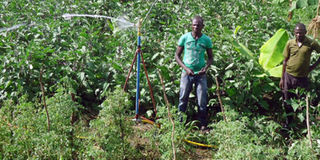Irrigation way to go, farmers told

A farmer in Awere Village, Odek Sub-county in Omoro District irrigates his vegetable garden last year. PHOTO BY TOBBIAS JOLLY OWINY
Lira- As the rainy season creeps in, farmers countrywide use the opportunity to open up fields to prepare for the planting season. However, the major challenge with seasonal planting, experts warn, is that since many farmers wait to plant during rainy season, this leads to a surplus in the market, forcing the market prices to drop drastically.
Agricultural experts have now called on the farmers to embrace irrigation other than waiting for rain.
Currently, farmers in many districts of northern Uganda are waiting for rain to plant their seeds since rain disappeared in early July.
“We are told rain will return soon, so we are still waiting,” says Margaret Okello, a farmer from Angwetangwet Village, Adekokwok Sub-county in Lira District.
Government urged
Experts are calling on governments in Africa to invest in farmer-led irrigation expansion and development.
Ambassador Ertharin Cousin, a Distinguished Fellow on Global Agriculture, told this newspaper in an interview last Friday that water and irrigation are important to the growth of agriculture.
“Crops do not need rain alone but water,” she said, adding: “This farmer-led irrigation is critical because it empowers farmers, and we need to invest in the policies to support the scaling up of irrigation. We must also talk about including women by reaching out to women organisations.”
Ms Elizabeth Nsimadala, the president of Eastern African Farmers Federation, highlighted the strategic importance of farmer-led irrigation in developing countries, as well as “targeting youth and women.”
“Africa cannot sustainably feed its people without irrigation,” she said, noting that sustainable agricultural intensification is critical to achieving the Sustainable Development Goals.
She also acknowledged the importance of innovative financial models, and that farmers need to see the long-term benefits of their investments.
The World Bank emphasises the need to focus on supporting farmer-led irrigation to reduce global inequality and poverty.
“Crops do not need rain, they need water and how do you bring water to the crops? It is through farmer-led irrigation, which we have seen over the years,” an official from the Bank said during the African Green Revolution Forum that ended in Kigali on last Saturday.
Mr John Kinaga, director of programmes at MoneyMaker, explains the concept of farmer-led irrigation.
“The farmer should consider utilising a water source near his farm. The second thing is to consider the size of the farm in order to choose the suitable irrigation system,” he said.
“You pump water from the source, store the water in the tank and then you use it to irrigate your crops. You can also store water at a certain height and release it to your field by means of gravity.”
Advantages
Farmer-led irrigation schemes provide better food security, protect millions of farmers from climate risks and reduce poverty in the sub-Saharan Africa and South Asia, according to a study commissioned by the AgWater project between 2009 and 2012.
The researchers studied small-scale irrigation systems among more than 1,000 farmers in South Asia and sub-Saharan Africa, as well as the aid and structural mechanisms.
Farmers in Lira and Otuke districts of northern Uganda are counting losses after the prolonged dry spell that lasted two months razed down all the crops planted at the beginning of second planting season.
“I had planted beans, peas and maize in my two-acre land but when the dry spell set in, I lost everything,” Mr David Otim, a farmer from Orum Sub-county in Otuke District, said.



